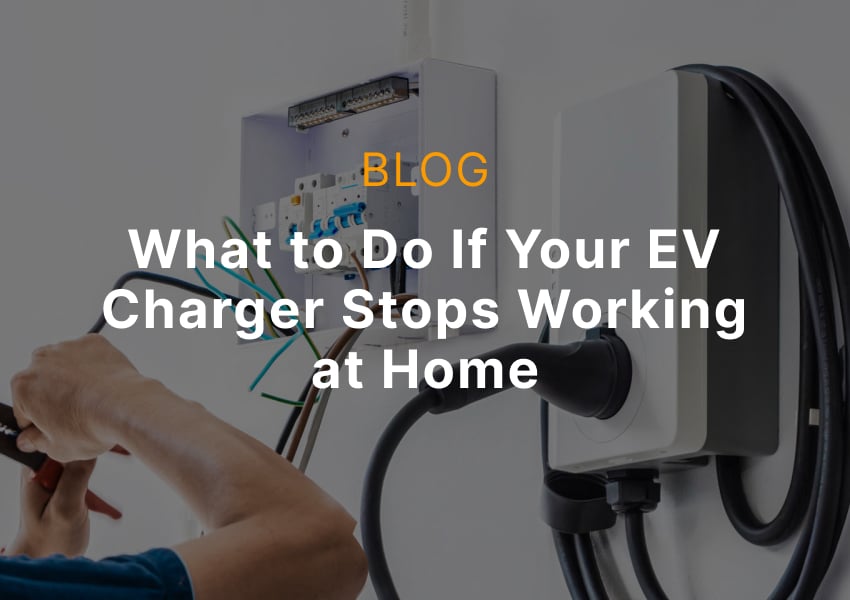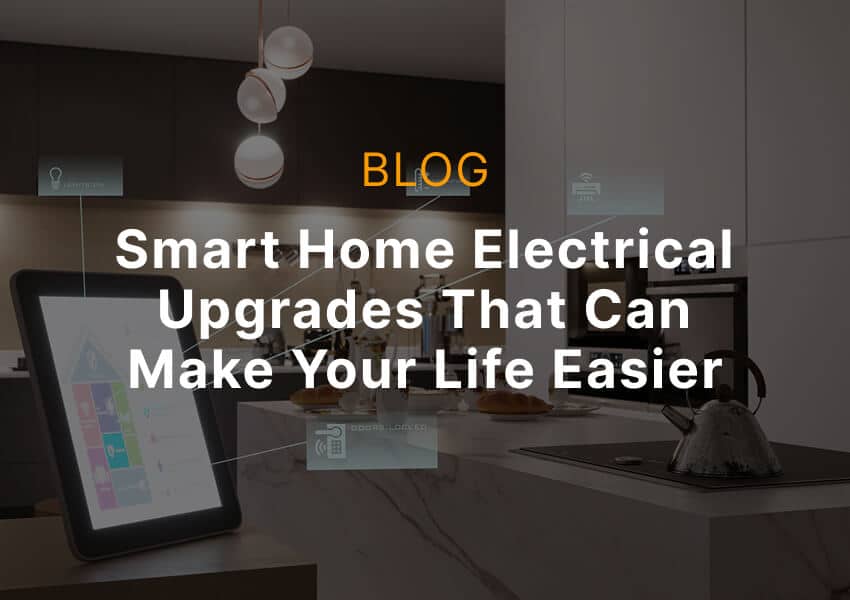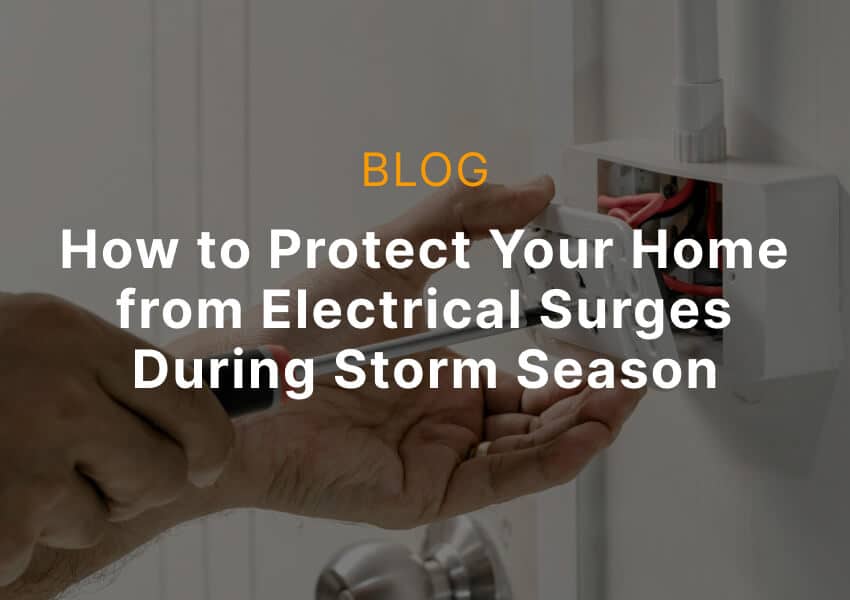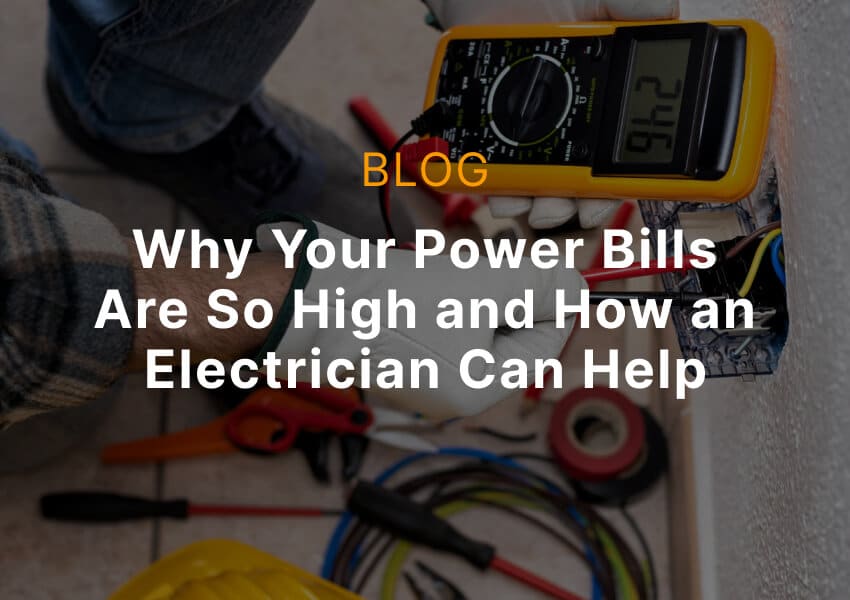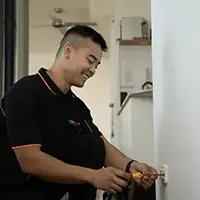When your electric vehicle stops charging, it can throw off your whole day. Whether it’s a power issue, a tripped circuit, or a hardware fault, acting quickly matters. Understanding the causes of EV charger repair issues helps you stay safe and avoid expensive replacements. This guide breaks down what to do when your home charger fails, how to troubleshoot common faults, and when to call a licensed electrician for help.
Common Reasons Your EV Charger Stops Working
When your home EV charger suddenly stops, it can be frustrating and confusing. Understanding the most common causes helps you fix smaller issues quickly and know when professional help is needed.
1. Power Supply Interruptions
If your charger isn’t receiving consistent power, it won’t charge properly. Check your switchboard for tripped breakers or blown fuses. If power problems persist, avoid resetting repeatedly and call a licensed electrician.
2. Faulty Charging Cables
Cables are often the first part to wear out. Look for fraying, bent pins, or discolouration. These are early signs that you might need an EV charger cable repair to prevent safety hazards.
3. Internal Charger Faults
Sometimes, internal components fail over time due to heat or electrical surges. This is where EV charger fault diagnosis becomes essential. A certified electrician can conduct fault detection services, safely test the charger and identify whether parts need replacing.
4. Connectivity or Software Glitches
Many chargers use smart systems or apps to control charging. If your charger’s lights flash or the app shows errors, perform a soft reset. Persistent faults may require an update or EV charger maintenance & repair by a professional.
5. Environmental Factors
Outdoor chargers can be affected by water, humidity, or extreme heat. Check seals, covers, and wiring for visible damage. Moisture exposure can lead to corrosion or short circuits that demand immediate attention.
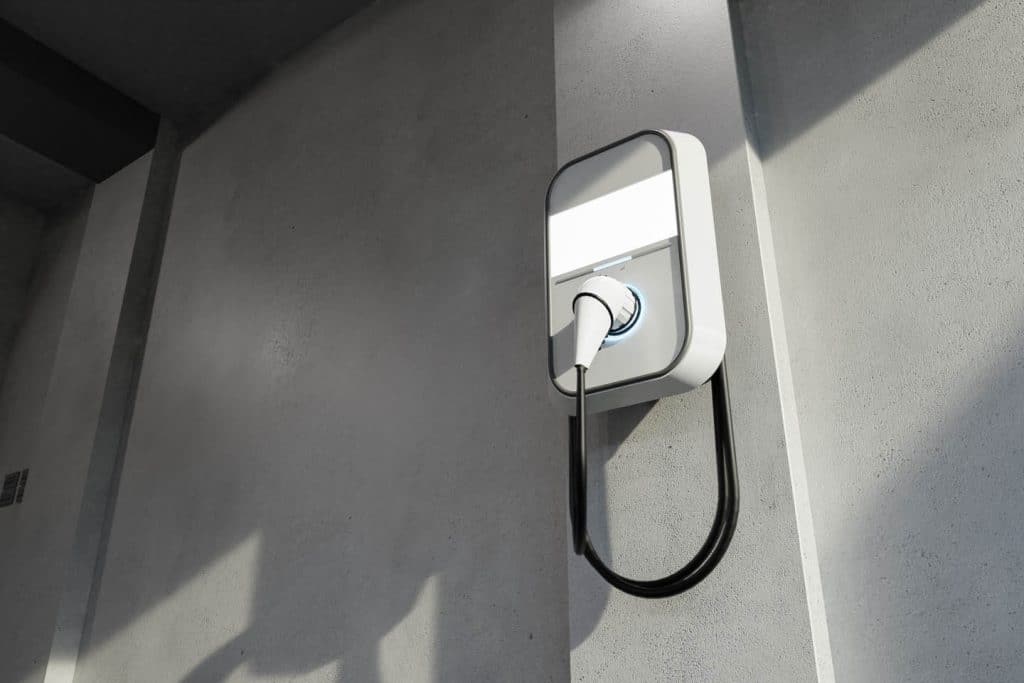
How to Troubleshoot a Charger That’s Not Working
When your EV charger fails to start or stops mid-charge, a few quick checks can help you pinpoint the issue. These safe steps can save time before calling for EV charger repair.
1. Check the Power Source
Ensure the charger’s circuit breaker is on and that no other major appliances have tripped it. If it keeps tripping, stop using the charger immediately. This may signal an underlying electrical fault.
2. Inspect the Charger and Cable
Visually inspect the plug, port, and connector for dirt, debris, or visible damage. Small issues like corrosion or bent pins can stop the flow of power. Avoid attempting any internal repairs yourself.
3. Restart or Reset the Charger
Some models allow you to reset the system manually or via an app. A soft reset often clears temporary glitches. If nothing changes, it’s time for a professional inspection or home EV charger repair.
4. Test Another Power Outlet
If your charger connects through a wall outlet, test another one to rule out a faulty socket. If all outlets fail, your home’s wiring or circuit may need expert testing.
5. Monitor Charger Lights or App Messages
Modern chargers display fault codes or flashing indicators when issues arise. These alerts help electricians quickly locate the fault, saving time during a service call for EV charger not working problems.
When to Call a Licensed Electrician for EV Charger Repairs
Even if your charger looks fine, hidden faults can cause risks like overheating, tripping circuits, or damaging your vehicle’s battery. Knowing when to call an expert ensures your system stays safe and reliable.
Persistent Power Failures
If your charger shuts off mid-charge or trips your safety switch often, don’t keep resetting it. Repeated failures signal a serious issue that needs prompt EV charger repair by a licensed electrician.
A Level 2 electrician can safely inspect your mains supply, upgrade circuits, and restore reliable EV charging power.
Burning Smells or Heat Marks
Any sign of heat around the plug, wall, or cable should be treated as an emergency. Unplug immediately and call a 24/7 emergency electrician. This could point to internal damage requiring EV charging station repair or component replacement.
Damaged or Exposed Wiring
Cracked cables, melted insulation, or exposed wires can quickly lead to electric shock. This is not a DIY job; an electrician must assess the problem and carry out safe EV charger maintenance & repair.
Recurring Error Messages
If your charger or app keeps displaying fault codes even after resets, there could be a communication or sensor issue. A technician will run a detailed EV charger fault diagnosis to isolate and fix the cause.
Warranty or Safety Concerns
Attempting repairs yourself can void your EV charger repair warranty. Always call a qualified technician who understands your model and complies with Australian electrical safety standards.
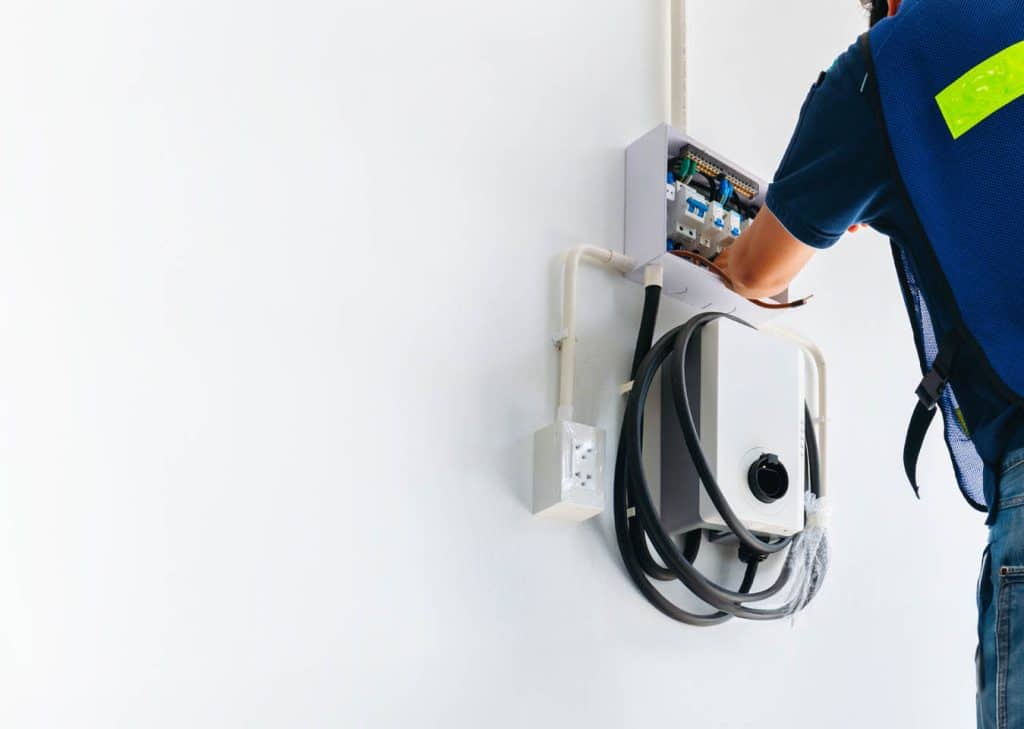
How Much Does EV Charger Repair Cost in Australia
Understanding repair costs helps you budget for maintenance and avoid unexpected bills. Prices vary depending on the problem, charger type, and whether replacement parts or rewiring are required.
Factors That Affect Pricing
Your repair cost depends on labour time, brand, and whether your charger is wall-mounted or freestanding. Accessibility also plays a role; outdoor or underground setups can increase job complexity.
Cost of Replacement Parts
Replacement connectors, charging cables, or software modules can vary significantly in price. Choosing genuine parts ensures compatibility and long-term safety, especially for commercial EV charger repair, where reliability is critical.
Preventing Expensive Repairs
Scheduling regular servicing helps detect small issues early. With routine checks, you can avoid major faults and extend your system’s lifespan, reducing your need for frequent EV charger repair visits.
Preventive Maintenance for Long-Term Charger Reliability
Regular upkeep is the key to avoiding sudden breakdowns. With routine checks and cleaning, you can prevent faults, extend equipment life, and reduce the need for frequent professional EV charger repair services.
1. Schedule Regular Inspections
Have your charger inspected at least once a year by a licensed electrician. They can perform essential safety checks, clean terminals, and look for early signs of wear that require EV charger maintenance & repair.
2. Keep Connections Clean and Dry
Moisture and dust are two of the biggest enemies of charging systems. Use protective covers if your unit is outdoors. Dry connectors before plugging in to avoid corrosion and damage.
3. Monitor Performance and Alerts
Pay attention to charging times, indicator lights, and app notifications. Slow charging or new error codes could point to minor faults that, if ignored, become costly to fix later.
4. Replace Worn Cables Early
Cables naturally degrade with use. Replacing them promptly prevents short circuits and maintains consistent charging speed. Timely EV charger cable repair helps keep your system safe and efficient.
5. Log Servicing and Warranty Checks
Document every inspection and repair. This record helps electricians diagnose recurring issues and ensures your EV charger repair warranty remains valid if problems occur later.
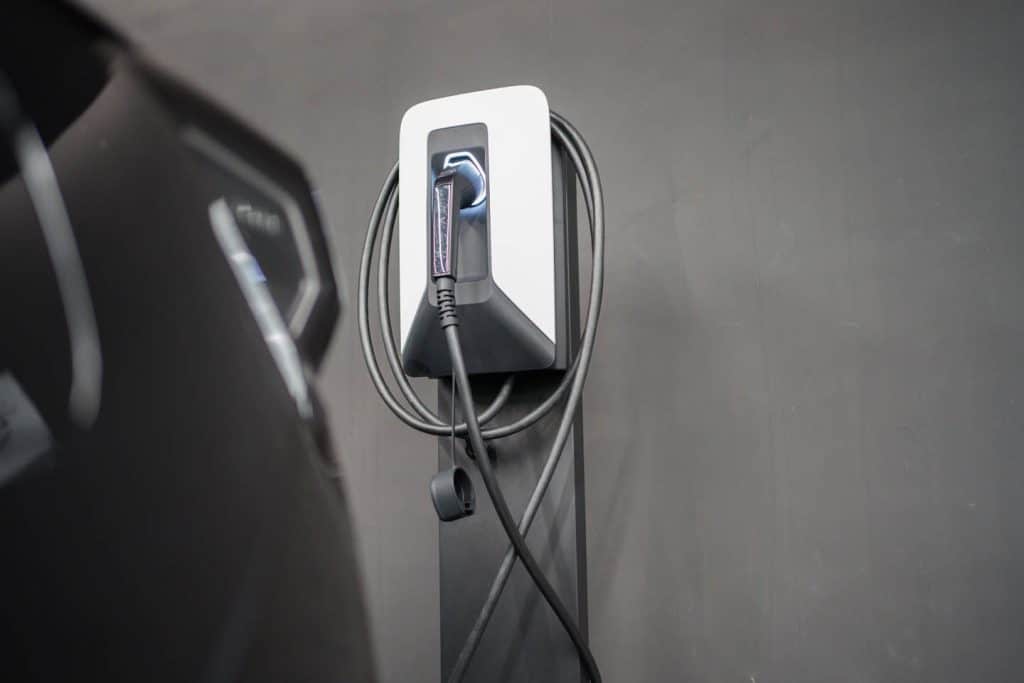
Why Professional EV Charger Repairs Matter
Attempting DIY electrical work on high-voltage equipment can be dangerous. Licensed electricians bring expertise, tools, and safety training that ensure your EV charger repair is done right the first time.
Safety and Compliance
Electric vehicle chargers run on complex electrical systems that must comply with Australian Standards. Professional electricians follow strict safety protocols, ensuring your charger operates safely and efficiently after every service.
Accurate Fault Diagnosis
A certified electrician can pinpoint the exact issue quickly, saving time and money. Their diagnostic tools detect issues that visual checks miss, making professional EV charger fault diagnosis far more reliable than guesswork.
Long-Term Reliability
Professional servicing extends your charger’s lifespan. When repairs and calibrations are performed correctly, you’ll experience faster, more stable charging and fewer future breakdowns.
Warranty Protection
DIY fixes or unlicensed work can void your EV charger repair warranty. Hiring an accredited electrician ensures all work remains covered and compliant with manufacturer requirements.
When to Replace Instead of Repairing Your EV Charger
Even the best chargers eventually wear out. Understanding when replacement is better than repair helps you save money, improve safety, and ensure your charging system performs efficiently for years.
Frequent Breakdowns
If your charger keeps failing despite repeated servicing, replacement may be more economical. Constant faults often signal internal wear that repairs can no longer fix effectively.
Outdated or Incompatible Models
Older chargers may not support newer vehicle software or faster charging capabilities. Upgrading ensures better energy efficiency and compatibility with your EV’s latest features.
Physical or Water Damage
Severe corrosion, cracks, or water ingress can permanently damage internal components. In such cases, replacement is the safest option to avoid electrical hazards or costly EV charger repair attempts.
Expired Warranty
If your warranty has ended, future repairs could become expensive. Replacing the unit gives you renewed coverage and peace of mind, especially when paired with a trusted electrician’s workmanship guarantee.
Planning for Future Upgrades
If you’re considering switching to a new EV or installing multiple chargers, upgrading early helps ensure your system meets future capacity and safety needs without ongoing disruptions.
Getting Reliable Help When Your EV Charger Fails
A malfunctioning home charger doesn’t always mean replacement. Understanding the issue early, following safe troubleshooting steps, and calling a licensed electrician when needed will save you time, money, and stress. Whether it’s a cable fault, power issue, or system error, timely EV charger repair keeps your vehicle charged and your home electrical system protected.
If your EV charger has stopped working, Powerhub Electrical can help. Our licensed Sydney electricians specialise in safe, efficient repairs across Epping, Parramatta, and surrounding suburbs. Call 0400 332 331 today for reliable same-day service, expert diagnostics, and long-lasting solutions backed by our quality workmanship guarantee.

